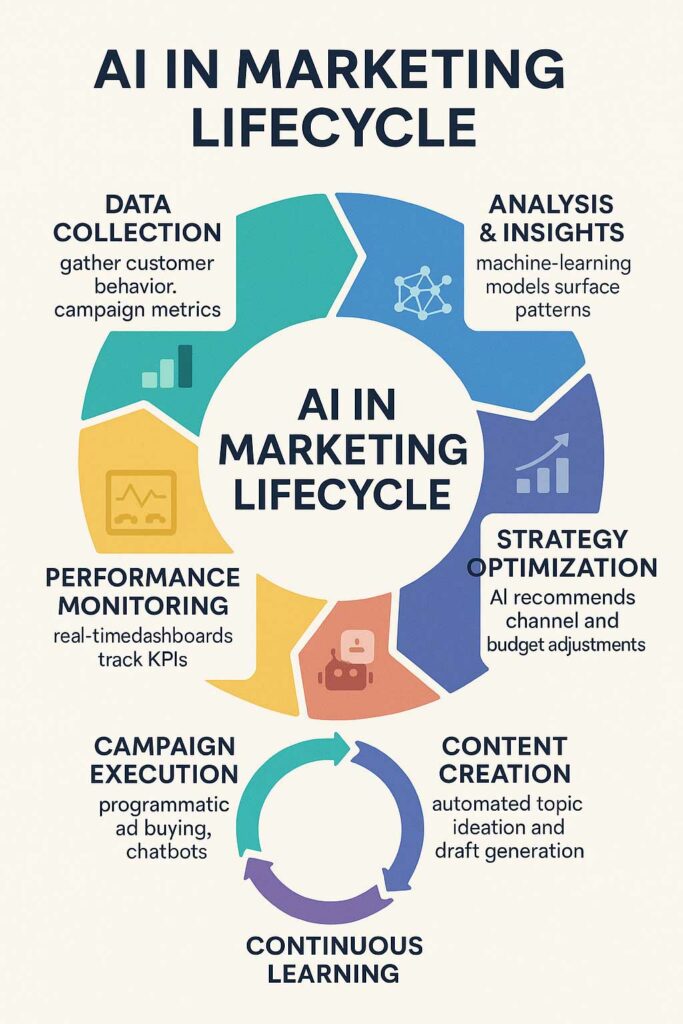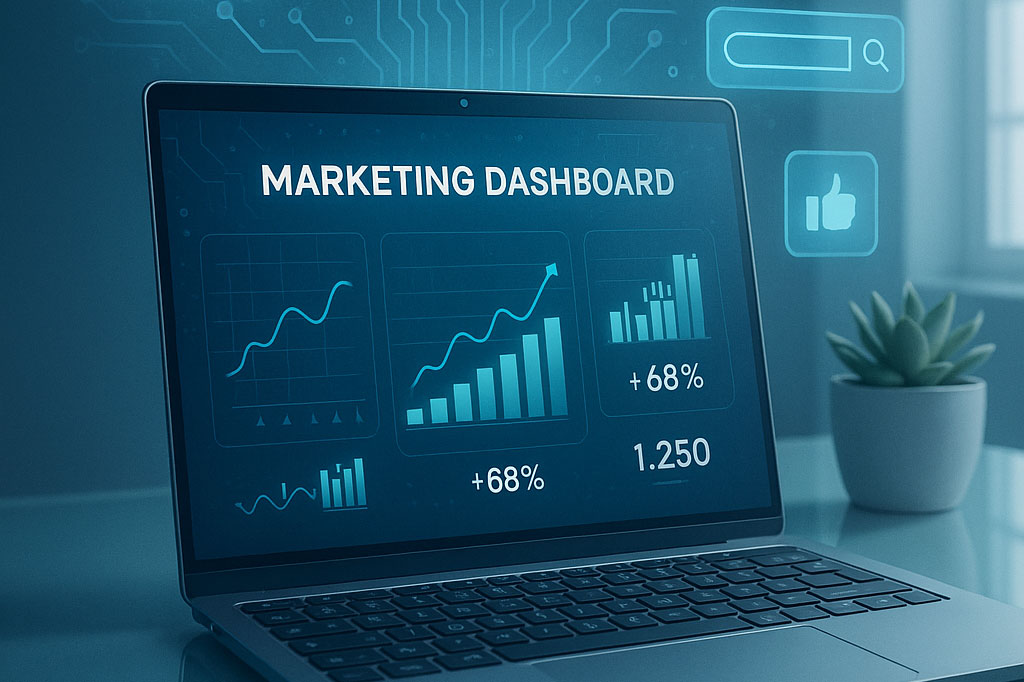How can I weave AI into a modern digital marketing strategy without feeling lost?” That’s the million‑dollar question marketers, including Slocum Studio, ask today. In this section, we’ll unpack five core areas to get you grounded:
- What Is AI in Marketing? We’ll define AI in plain terms and show why it isn’t just a buzzword.
- The Evolution of AI Tools: Learn how we went from clunky automation to smart, predictive engines.
- Key Benefits for Your Strategy: You’ll learn which advantages matter most from hyper-personalization to workflow automation.
- Common Misconceptions Debunked: AI isn’t here to replace you; it’s here to supercharge your existing team.
- Setting Clear AI Objectives: Even the best AI tools stall without a roadmap. We’ll cover how to set actionable goals that align with your overall digital marketing strategy.
Together, these five pillars will give you a bird’s‑eye view—much like an aerial drone shot—of how AI fits into your day‑to‑day. By the end, you’ll know what AI can do and how each capability can plug directly into your digital marketing strategy’s existing channels and workflows. Ready to see the bigger picture?

AI in a Modern Digital Marketing Strategy
Artificial Intelligence in marketing isn’t science fiction—it’s simply software trained to recognize patterns and make decisions. Think of AI as an assistant that sifts through piles of customer data, identifies buying cues, and suggests the next best action, all in real time. In a modern digital marketing strategy, AI can handle tasks like segmenting audiences, recommending products, and even drafting content outlines.
We use the pro versions of Gemini, Chat GPT, and Perplexity daily. They’re embedded in our workflow.
At its core, AI learns from data. For example, machine‑learning models analyze past campaign performance to predict which email subject lines drive opens. Natural Language Processing (NLP) tools scan social media chatter to gauge customer sentiment. In both cases, AI boosts your ability to respond faster and more accurately than manual methods.
Why does this matter? With your AI in a Modern Digital Marketing Strategy, timing and relevance are everything. You want the right message in front of the right person at the right time. AI ensures you’re not shooting in the dark—rather, you’re firing pinpointed rockets of personalized content. And because the software keeps learning, your campaigns continuously improve without needing a complete overhaul every quarter. AI in marketing is like having a tireless analyst and creative partner rolled into one—helping you optimize your digital marketing strategy daily.
The Evolution of AI Tools

Remember when “automation” meant scheduling a social post and calling it a day? AI tools have come a long way. Today’s platforms combine machine learning, predictive analytics, and NLP to power truly intelligent workflows. Let’s trace that journey:
- Rule‑Based Automation: Early tools followed static, “if‑this‑then‑that” logic—fine for drip email campaigns but limited when customer behavior spiked unpredictably.
- Predictive Analytics: Next came AI engines that used historical data to forecast trends—improving budget allocation in your digital marketing strategy.
- Deep Learning & NLP: Modern models read and interpret natural language, from chatbots answering questions to sentiment analysis flagging unhappy customers before they churn.
- Autonomous Marketing Platforms: Some solutions can now run entire campaigns end‑to‑end, tweaking ad bids and creative elements on the fly.
This evolution means you’re no longer tethered to manual updates or guesswork. The AI you adopt today can adapt in real time—telling you which blog posts to promote, which ads to pause, or even drafting personalized copy drafts.
As your AI in a Modern Digital Marketing Strategy matures, these tools free you up to focus on higher‑order tasks—like creative direction and big‑picture planning—while the AI handles the repetitive heavy lifting.
We find this invaluable for our blogging, keyword research, and more! It’s like upgrading from a bicycle to a self‑driving car: you still choose the destination, but the journey is hands‑off.
Key Benefits of AI in a Modern Digital Marketing Strategy
Integrating AI into your digital marketing strategy isn’t just about flashy tech—it delivers results. Five key benefits stand out:
- Improved Targeting: AI analyzes thousands of data points—demographics, behavior, browsing patterns—and pinpoints the audience segments most likely to convert. This granularity boosts ROI and reduces wasted ad spend.
- Predictive Analytics: By forecasting trends, AI helps you anticipate customer needs before they even vocalize them. Imagine stocking up on a hot‑selling product just as demand peaks.
- Hyper‑Personalization: Beyond “Dear [First Name],” AI crafts individualized experiences—recommending content, products, or deals tailored to each user’s unique journey.
- Workflow Automation: Tedious tasks like A/B testing, reporting, or social posting can be automated. This frees your team to focus on strategy and creativity—the real drivers of growth.
- ROI Measurement: Real‑time dashboards show which channels and campaigns move the needle, letting you reallocate resources swiftly and strategically.
These benefits feed directly into every aspect of your digital marketing strategy. With AI‑powered targeting and predictive analytics, you no longer spray‑and‑pray; you fire precision‑guided missiles at high‑value segments.
Hyper‑personalization keeps customers engaged longer, while automation reduces manual drudgery and human error. Finally, instant ROI insights give you the feedback loop needed to optimize on the fly—like tuning an engine while racing. Together, they form a virtuous cycle of data‑driven improvement.
Common Misconceptions Debunked
AI can feel like a black box, but don’t let it hold your business back from using its potential:
- Myth 1: AI Will Replace Marketers. In reality, AI handles repetitive tasks, not creative strategy. Think of it as a smart sidekick, not a rogue robot.
- Myth 2: AI Requires Big Budgets. Many entry‑level AI tools are affordable or even free, and you can start simple—like adding a chatbot—before scaling up. You can purchase a pro Gemini plan for as little as twenty dollars per month.
- Myth 3: Data Privacy Is Impossible with AI. Modern solutions include built‑in compliance features—GDPR, CCPA—or you can anonymize PII before analysis.
- Myth 4: AI Always Gets It Right. No algorithm is perfect. Human oversight is essential for training models, correcting bias, and ensuring brand voice remains intact.
- Myth 5: You Need a Data Scientist on Staff. While data expertise helps, many AI platforms offer user‑friendly dashboards and guided workflows so marketers can jump in without coding skills.
So, you can enhance your digital marketing strategy. Instead of fearing a takeover, you’ll view AI as the ultimate teammate—efficient, consistent, and tireless.
Start small, validate results, and gradually expand your AI toolkit. You’ll find that the only thing holding you back is the willingness to experiment. Read about AI and WordPress on this blog AI for WordPress.

Are you interested in maximizing your online growth? We can help with your Digital Marketing Strategy, Web Design and development, SEO, and content writing. Talk to Us! Call: (857)400-8959
Setting Clear AI Objectives
Even the fanciest AI tool flops without smart goals. Here’s how to align your AI initiatives with your digital marketing strategy:
- Define Success Metrics: What matters most? Website traffic, lead quality, conversion rates, or churn reduction? Choose 2–3 KPIs and stick to them.
- Map AI Use Cases to Goals: If you aim higher engagement, deploy AI‑driven personalization. If it’s cost savings, focus on automating campaign optimizations.
- Pilot Small Projects: Start with a single channel—like email subject‑line optimization—run a 4‑week test, and measure lift.
- Document & Iterate: Log your experiment design, outcomes, and lessons learned. Use that intel to refine your digital marketing strategy.
- Scale Gradually: Once a pilot shows a 10–20 % performance boost, expand to other channels, but maintain oversight to catch any unintended side effects.
Clear objectives prevent you from chasing shiny objects and ensure your AI efforts actually support your broader digital marketing strategy. Think of objectives as the compass guiding a ship: they keep you on course amid data overload and complex technology choices. With solid goals in place, your AI-powered campaigns won’t just run—they’ll sail smoothly toward measurable results.
Do you need help with your AI planning? Contact us!
Stay connected
We’re always hard at work putting out new content covering WordPress, marketing, and SEO news. Stay connected with us 100% spam FREE.


This article offers valuable insights into integrating AI into modern digital marketing strategies. The breakdown of AI’s evolution from basic automation to advanced predictive analytics is particularly enlightening. It’s a helpful resource for businesses looking to enhance their marketing efforts through AI-driven solutions.
Ever felt overwhelmed by the vast world of digital marketing? I did too—until I explored Slocum Studio’s guide on structuring a digital marketing strategy. Breaking down the process into clear steps like analyzing current performance, identifying target audiences, and creating a content strategy made it more manageable. For small businesses, this structured approach can lead to more focused and effective marketing efforts.